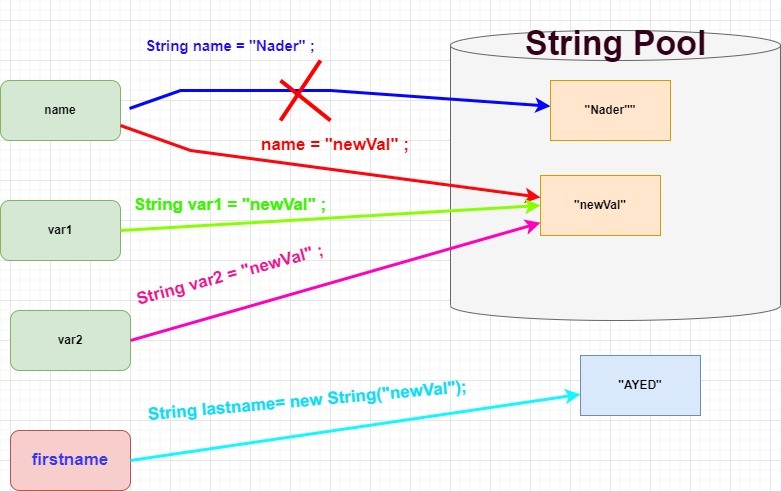Unalterable Strings: A Key Element in Ensuring Information Uniformity and Integrity
In the world of data management, the value of unalterable strings can not be overemphasized. These imperishable series of characters play an essential role in upholding the stability and precision of details within systems. By keeping a state of immutability, data consistency is made sure, cultivating a structure of dependability upon which critical procedures depend. The principle of immutable strings goes beyond plain triviality; it is a cornerstone in the complex web of information governance. As we explore the advantages, execution approaches, and useful applications of immutable strings, a more clear picture emerges of their vital nature in securing the digital landscape.
The Concept of Unalterable Strings
Immutable strings, an essential principle in programming, refer to strings that can not be changed once they are developed. Fundamentally, when a string value is appointed, any operation that appears to change the string really develops a brand-new string. This immutability guarantees information uniformity and reliability in applications, as it stops unexpected modifications to the initial information.
Advantages in Data Uniformity

Data uniformity is critical in numerous aspects of software application development, consisting of data source management, multi-threaded environments, and distributed systems (Why are strings immutable in Java?). Immutable strings contribute considerably to achieving this consistency by protecting against data corruption as a result of concurrent accessibility. In situations where several procedures or strings interact with the very same information simultaneously, immutable strings serve as a guard versus race conditions and synchronization issues
Moreover, the immutability of strings streamlines debugging and screening procedures. With immutable strings, developers can trust that when a string is set, it will certainly stay the same, making it simpler to trace the resource of mistakes and making sure that test instances produce constant outcomes. This dependability in information taking care of eventually leads to a lot more robust and secure applications.

Applying Unalterable Strings
Making certain the immutability of strings requires a thoughtful approach to their implementation in software program advancement. One key approach is to make string classes in such a way that protects against modifications when a string things is produced. By making strings immutable, developers can improve data consistency and integrity in their applications.
To carry out unalterable strings efficiently, developers should prefer developing brand-new string objects as opposed to changing existing ones. This practice guarantees that when a string is appointed a value, it can not be changed. Furthermore, any type of procedure that appears to modify the string must produce a brand-new string with the desired modifications instead of changing the initial.
Furthermore, using immutable strings can streamline concurrency monitoring in multi-threaded settings. Given that immutable strings can not be altered after production, they can be safely shared among multiple strings without the threat of information corruption.
Duty in Reliability Assurance
In software growth, the use of immutable strings plays a crucial function in making certain the dependability of data procedures. Immutable strings, when created, can not be modified, making sure that the information they represent remains regular throughout the application's execution. This immutability property provides a level of guarantee that the data being refined will not be inadvertently transformed, resulting in unforeseen end results or mistakes in the system.
By integrating immutable strings into software program design, designers can improve the integrity of their applications by lessening the risks connected with mutable information - Why are strings immutable in Java?. Unalterable strings assist in preventing data corruption or unintended adjustments, which can be specifically essential when managing delicate details or when data stability is extremely important
Moreover, the usage of immutable strings streamlines simultaneous handling, as numerous strings can securely gain access to and share Continued string data without the danger of one thread modifying the material while one more reads it. This aspect adds significantly to the total integrity of the software system, making certain foreseeable and regular behavior in data managing operations.
Applications and System Integration
The smooth assimilation of unalterable strings right into different applications and systems is pivotal for making certain robust information uniformity and integrity across varied technical environments - Why are strings immutable in Java?. Immutable strings play an essential duty in enhancing the stability of data exchanges and communications within complex software application communities. By including immutable strings right into applications, designers can mitigate the dangers related to data meddling, unauthorized adjustments, and inadvertent modifications, therefore fortifying the total protection stance of the system
In the context of system integration, unalterable strings work as a foundational aspect for establishing safe interaction channels and facilitating smooth data transfers between different elements. Their unalterable nature makes certain that data transmitted in between systems stays unchanged and verifiable, lowering the likelihood of disparities or errors that can endanger the integrity of the entire system. Furthermore, immutable strings can boost interoperability between diverse systems by supplying a standard layout for information depiction, enabling a lot more reliable information processing and exchange methods throughout interconnected platforms. By embracing immutable strings in applications and system assimilation procedures, organizations can fortify their data facilities and promote the reliability and uniformity of their info possessions.
Conclusion
To conclude, immutable strings play a vital role in preserving information uniformity and reliability in numerous applications and system assimilations. By making certain that strings can not be altered once developed, the honesty of data is maintained, lowering the danger of incongruities and errors. Applying unalterable strings can considerably enhance the reliability of systems, ultimately bring about more accurate and dependable information handling.
